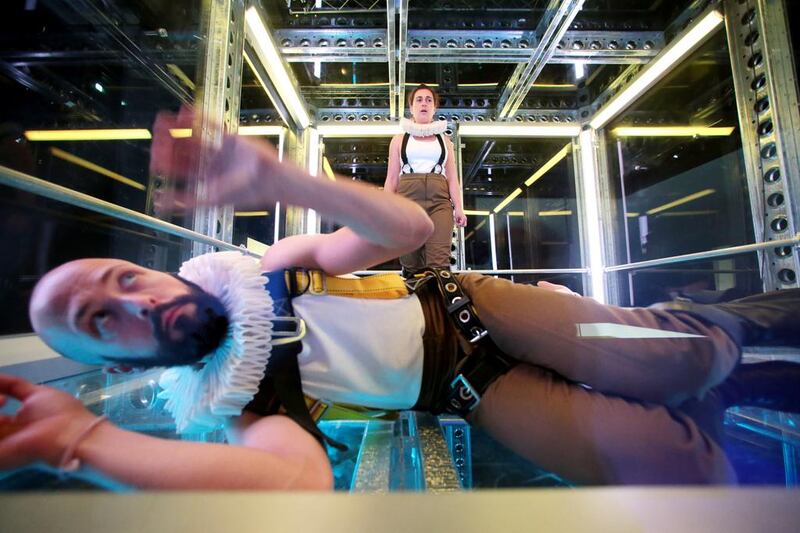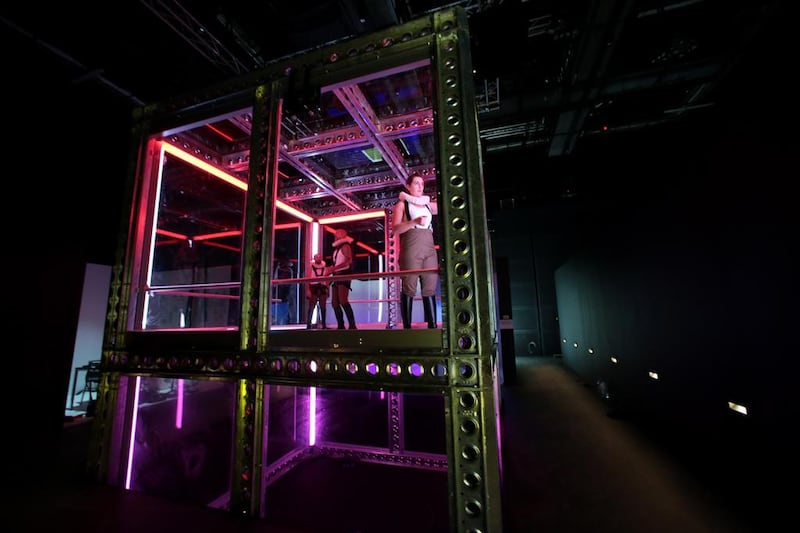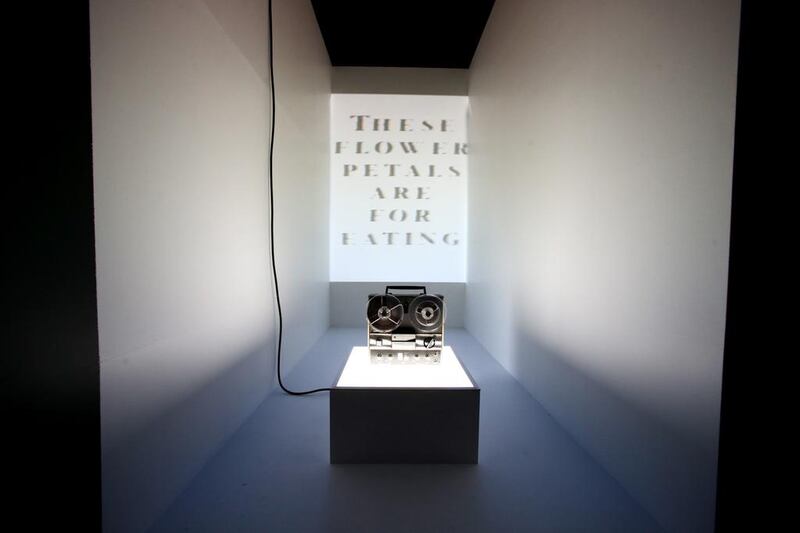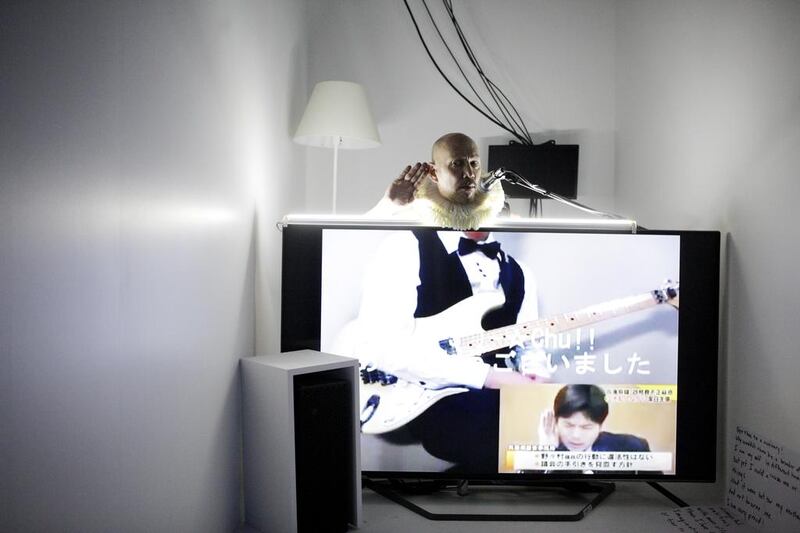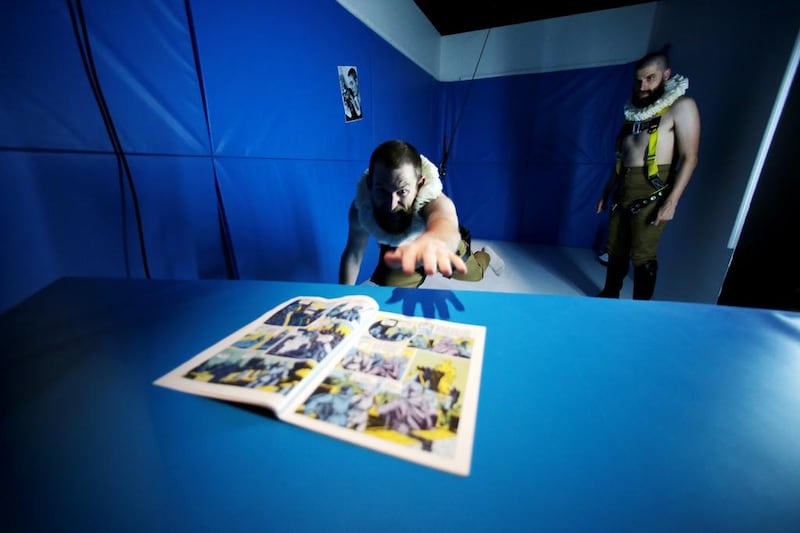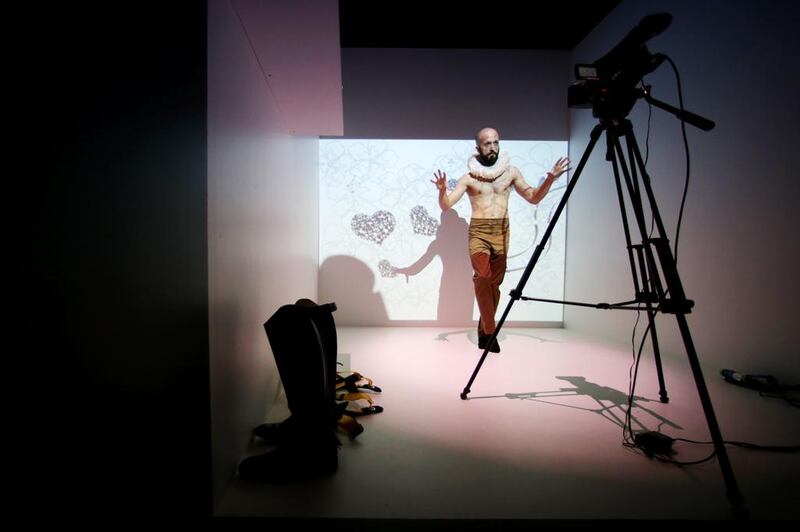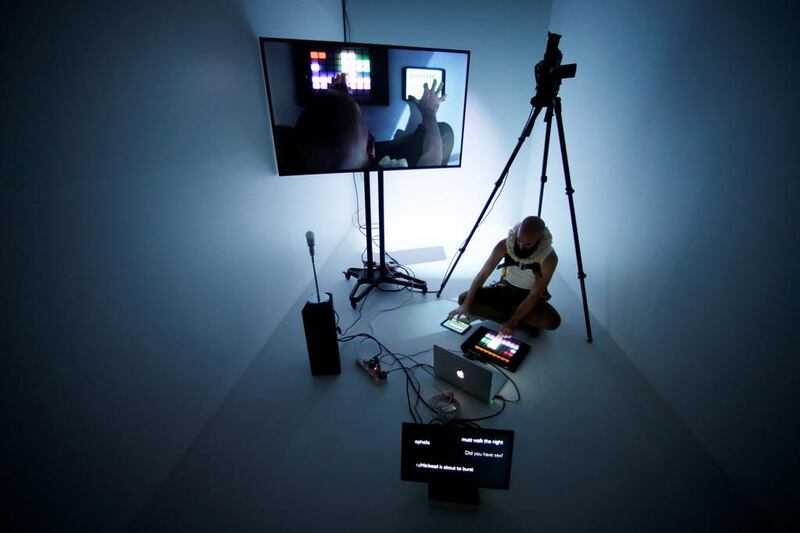In a discussion about William Shakespeare's Hamlet, there are certain phrases and expressions that you might expect to come up. The words "crazy" "exciting" "cool" and "awesome" are definitely not among them. But then, Theater Mitu's production of Hamlet/Ur-Hamlet, which has its world premiere at NYUAD Arts Center this Thursday night complete with a garage rock band performing live, is more than a little bit unexpected. In fact, it's fair to say that you won't have experienced a production of Hamlet quite like it before.
As the title suggests, Hamlet/Ur-Hamlet uses the text that the English playwright committed to paper around 1599 as source material but acknowledges that the legend of the Prince of Denmark, a young man who loses his father and suffers at the hands of his uncle, has even deeper roots in Scandinavian, European and Roman folklore. The sources that Shakespeare himself drew upon are the subject of much academic debate and the only real certainty is that it is not an original work.
It’s surely not inappropriate then that the experimental theatre company, which has been based at New York University in Abu Dhabi for the past four years, takes Shakespeare’s play as a starting point and has a kind of fun with it, mixing the company members’ individual responses to the Elizabethan work with the idea of “Hamlet” and the very many associations the name holds. The result is an hour-long piece of theatre that leaps over traditional boundaries: part dramatic performance; part art gallery of installations; part rock concert.
The 100-strong audience will be invited to explore the installations at their own pace, eating flower petals along the way, and gathering (or not) around a central performance space at intervals to listen to The Othermen perform original punk-rock songs and to watch seven members of the company perform short extracts from Shakespeare's Hamlet.
The overall arc of the performance also demands many different emotional responses from the onlooker, from the comic to the tragic, much like the Hamlet that everyone knows – or thinks they know, and there’s the rub.
"If you bring up Hamlet, even if you have never read it, you have associations," Rubèn Polendo, the founding artistic director of Theater Mitu, tells me. "The associations could be, 'it's boring' or 'I hate Shakespeare' – even that is an association. Other people say, 'it's the greatest piece of work', others 'it's literature'… I've never known an association and the source as being equally potent.
“The great revelation [during the work’s development] was that in the year 2015 as a contemporary company, our interest was not in doing Hamlet but in exploring that space between the source and the associations that people have.”
That process has taken three years and at one point a quite overwhelming amount of research into the many myths of Hamlet, textual versions of Shakespeare's play, myriad performances on stage and screen courtesy of libraries and grainy YouTube clips, as well as readings of later theatrical responses to Hamlet such as Heiner Müller's Hamletmachine (1977).
The idea of memory proved useful in curating all the material that the company created during a series of week-long laboratories, Polendo says. “One of the best ways to think about the piece is almost like entering this head that’s riddled with all the memories of what is, was, will be, has been. That’s the journey … you are travelling through all that, the personal, the academic, the emotional, the spiritual.”
The result is a "fragmented response to Hamlet with a capital H, not William Shakespeare's Hamlet," says Justin Nestor, one of Hamlet/Ur-Hamlet's co-creators as well as a performer. Dyslexic, he'd never read the play and wasn't even sure that he wanted to perform it when Hamlet was first proposed as a new artistic venture. Other company members, some of whom are well-versed in performing Shakespeare, were more enthused and this lack of a common response would eventually shape the interpretation.
"As an experimental theatre company, we are really trying to figure out how to not make an experience that is exclusive, that is only for people who appreciate that kind of work … and at the same time we were all of a sudden hitting up against this roadblock that we want to do Hamlet but how do we actually make Hamlet accessible?" he says.
“Accessible does not mean dumbing it down. It’s not about making the work more common, or more acceptable to more people, it’s actually about creating more access points.”
Those access points in a literal sense are present in Hamlet/Ur-Hamlet in the form of the 14-odd installations that ring the specially designed, Plexiglas- clad, central performance space inside NYUAD Art Center's generous Black Box Theatre. Once inside, it's up to each member of the audience how they navigate the warren of installations, some of which play video footage or audio clips while others have actors performing live in them; the content also changes at different points during the performance. Nestor describes the overall effect as a map of Hamlet or a "big theatrical graph" with each installation being a "small moment" that might almost be enjoyed independently of another.
As he explains: "It's not about Hamlet's narrative; this [installation] might be about family, or about fathers or about loss or about love. You can make all of these pieces and never say the word 'Hamlet' but if you come into something knowing that it's called Hamlet, you'll make the connections. You'll get from point A to point B."
It’s a very adult approach to theatre that demands that the audience take some responsibility for their own enjoyment: in short, you’ll get out what you’re prepared to put in. “The hope is that it’s this stimulating space but in order for that to happen – if we are going to be that ambitious in the scope of the piece – you have to have some agency, which is to say that you might not find A, B, and C interesting, and if I torture you by telling you that it’s interesting, then it becomes another kind of journey but, if you can ambulate yourself through it, there’s an authorship that you have to the experience and that’s exciting too.”
Theater Mitu is in its fifth year of residency at NYUAD and the connection to Abu Dhabi as the company's home is one that the Mexican-born Polendo takes very seriously. The liberal arts university also hosts an annual Global Shakespeare Festival, the theme of which is to understand the enduring resonance of a body of work that was first performed 400 years ago on the English stage. Those two facts make Theater Mitu's transformative, thematic approach to Hamlet highly appropriate, he says. "We have a very educated population in the core of Abu Dhabi whether it be Emirati, Arab diaspora, expatriate … What are those concerns that unify us as a city? Family is not Arab, family is not British, it is not Mexican, it is not American; it's a human experience that's happening in this city. That is interesting to me; that moves me.
“[In the same way] Shakespeare’s concerns are human. The image of Ophelia, this young girl in love who is so heartbroken that she takes her own life, is not ‘cultured’, it’s not an Elizabethan image; that’s a Mexican fear, that’s an American fear, that’s an Arab fear, so it transcends that and I love that because then, all of a sudden, we leave the folklore and enter the human.”
Inevitably, there will be traditionalists who'll be disappointed not to sit down to a performance of The Tragedy of Hamlet, Prince of Denmark, but Polendo is thoughtfully unapologetic. "I'm happy to feel like the liberties we are taking on the treatment of Hamlet we are able to take because there are and will be many opportunities for you to see Hamlet in your life. On top of that you can actually read the play; it exists as a piece."
If, reading this, you’re worried that the performance will be too lofty or downright obscure, you shouldn’t be. As Polendo says: “We get into these large-scale [discussions] … ‘When you see this you will reference the notion that Shakespeare…’ And I say ‘awesome’ because some people will get that but when my 85-year-old Mexican mother walks in and sees the show, what is she going to see?
“It’s important to me that at every single one of these [installations] there be clarity, that there be emotionality, and that the points of the puzzle, let’s say, are close enough that you can actually see that you are travelling through something, that it’s not a random collection.”
There will be moments that move you, challenge you intellectually and make you laugh, Polendo promises. “There are also moments that you will find just cool,” he says.
In graduate school, Polendo was taught that Hamlet as a play was "undirectable" but he believes the company has found a way to map the emotional and intellectual topography of the original text in a way that is difficult, if not impossible, in a more traditionally staged approach. The overall hybrid effect of an evening with Hamlet/Ur-Hamlet is "a wallop," he says, laughing. "What it is not? It is not ignorable, I will say that.
"Next week, you won't be like, 'Did I see Hamlet? I forgot.' That will not happen. And I think there is enough agency that you'll be able to create an experience that's meaningful to you."
Now that’s cool.
• Hamlet/Ur-Hamlet is being performed by Theater Mitu at the NYUAD Arts Center from Thursday to Saturday at 8pm, with an additional 2pm matinee performance on Saturday. Tickets are free of charge but registration is required. To register, visit hamletnyuad.eventbrite.com
Clare Dight is the editor of The Review.
